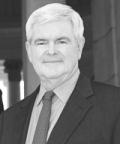 |
| Gingrich |
Gingrich had a lot of ups and downs in the race. He stumbled out of the gate with a poor performance on "Meet the Press" in May 2011. He was written off by most observers, but he steadily gained attention with his strong debate performances. Yet Gingrich did not "debate" his opponents in the traditional sense; he did not attack or get into arguments with his competitors. Instead, he presented "red meat" to the base in an interesting and articulate fashion. Gingrich, like so many others in the race, waited his turn as candidates crashed and burned. When Michele Bachmann, Rick Perry, and Herman Cain all cratered, Gingrich's numbers rose. By the end of November 2011, he was in the lead.
For a time, Gingrich had truly impressive poll numbers. In December, he was leading by a substantial margin in national primary polls as well as the state polls in Iowa, South Carolina, and Florida. Romney's campaign held firm, refusing to unleash its attack ads until mid-December, when they believed Iowa voters were really making up their minds. The attacks had an extraordinary impact, proving Gingrich had feet of clay. Gingrich crashed just in time for Santorum's numbers to go up, leading to a virtual tie in Iowa between Romney and Santorum.
The Gingrich rollercoaster wasn't finished, however. After Gingrich did badly in both the Iowa and New Hampshire contests, he suddenly rose again to win the South Carolina Primary by 12 points. He had done well in the debates again (particularly by attacking the liberal moderators), and he benefited from his regional connection. Romney inadvertently helped Gingrich by making some unforced errors, like not releasing his tax returns and not launching attack ads against Gingrich as he had in Iowa.
But once Romney's campaign returned to form, Gingrich was crushed in Florida. Republican voters clearly had reservations about Romney, but they were more afraid of selecting a candidate with Gingrich's doubtful electability. Nor could Gingrich's debate performances save him once Romney started taking an aggressive posture in the debates: Gingrich was good at expounding on various topics, but he wasn't very good at debating an opponent head-to-head. After Florida, the anti-Romney vote switched horses to Santorum and never looked back.
What will Gingrich's legacy be? He proved the importance of debates in the primary process. He also demonstrated Republican voters' preference for electability over red meat. Gingrich saw himself as a man locked in mortal combat with Romney, but ultimately Gingrich served to help Romney. Gingrich was the second-to-last Anti-Romney candidate. Santorum, the final Anti-Romney, was a stronger one, since he had fewer electability issues (though he did have some). Gingrich essentially took up space that Santorum needed. Gingrich's rise and fall in Iowa delayed Santorum's own rise, preventing Santorum from getting his needed clear-cut victory there. And Gingrich's victory in South Carolina prevented Santorum from gaining any steam until February. Gingrich also took some delegates that otherwise would have gone to Santorum. If Santorum had gotten those delegates, the race would have appeared closer, and Santorum probably would have performed better in late February, when Romney started beating him.





